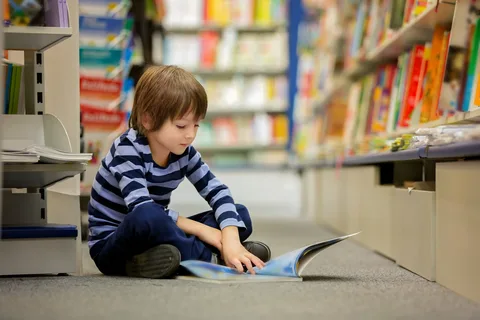Table of Contents
Â
Reading is one of the most enriching activities parents can encourage for their children. Whether your child is six months, six, or 16, reading provides amazing benefits for their mental health, social skills, stress management, and physical well-being. Helping young children discover the magic of books can instill a love for reading that will last a lifetime.
1. Encourages Bonding Between Parents and Children Â
Taking the time to sit down and read with your children is a distraction-free activity that allows kids and parents to bond from a young age. When parents read to infants, they connect and soothe their babies with a familiar voice.
As children grow, they continue to enjoy the intimacy and shared experience of reading. When parents establish a habit of reading to their children every day, kids come to expect and look forward to this quality time together. Â
2. Optimizes a Child’s Attention Span
The new age of technology has negatively impacted focus and concentration for both children and adults. Smartphones, TVs, computers, and tablets overstimulate and distract the brain and make it difficult for people to focus on one task for long periods of time.
One of the benefits of reading is that it exercises the brain and increases attention span. While your child might struggle to sit through a whole book at an early age, over time, you may notice they can sit and listen for longer periods of time. This is a vital skill that will improve outcomes in school and work. Â
3. Builds Empathy and Awareness of Different People and Experiences
Reading a fiction story allows children to explore and see the world from a different perspective. While it can be difficult for kids to understand how others think and feel differently than they do, novels provide unique insight into the mind of someone else – including their thoughts, emotions, problem-solving skills, and unique experiences.
Additionally, young readers are exposed to people, cultures, and experiences very different from their own. Through books, children can understand what it might be like to live in a different century or country. They learn about life in different parts of the world and learn to appreciate unique lifestyles, perspectives, and experiences.
Children can also learn to better understand their own emotions through reading. If a character is struggling with difficult emotions they can relate to, children learn that these feelings are normal and may even gain coping skills from seeing how the character reacts.
4. Fuels Language Development and Cognitive Abilities
While watching TV from an early age can delay language development, reading exposes children to new words. Children who read frequently are likely to have a larger vocabulary, improved memory skills, and a better understanding of how to use words correctly in a sentence.
However, the positive impact of reading on the brain goes beyond a large vocabulary. Listening to a story or reading independently strengthens and builds brain connections. Â Â Â Â
Reading allows children to develop problem-solving skills as they analyze situations characters are experiencing. Books also increase children’s knowledge, showing them how the world works, exposing them to history and science, and even helping them develop mathematical skills.
5. Reduces Occasional Stress and Promotes Relaxation
Occasional stress is difficult for people’s mental and physical health. However, reading is a very effective stress-relief activity. Additionally, parents can teach children that reading is a healthy coping mechanism for processing difficult emotions and experiences.
Reading can minimize a child’s negative or anxious thoughts by diverting their attention to words on the page. Reading physically lowers your heart rate and eases muscle tension, having a similar impact on the mind and body as meditation.
Help Your Child Become a Life-Long Reader
Reading isn’t just a beneficial activity for children. Adults can similarly benefit from carving time each day to curl up with a good book. Children who read often are more likely to continue reading as they age and experience these benefits well into adulthood.
